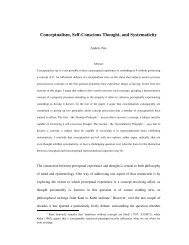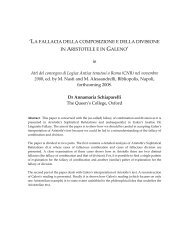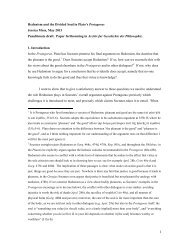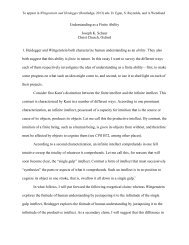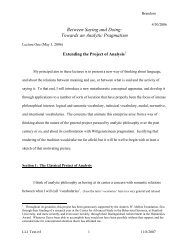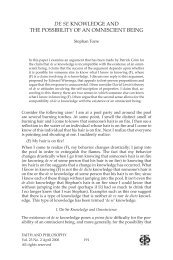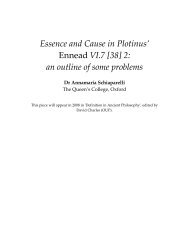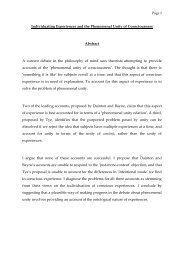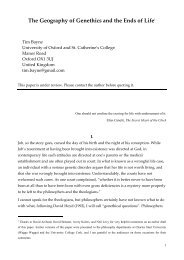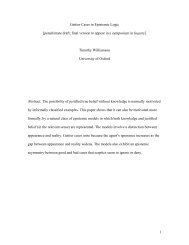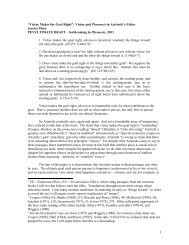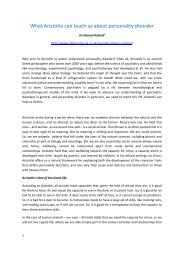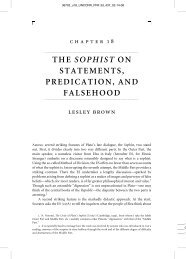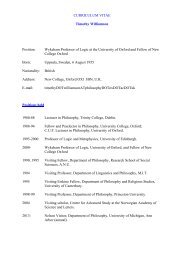Say who everyone is as you go along - Faculty of Philosophy ...
Say who everyone is as you go along - Faculty of Philosophy ...
Say who everyone is as you go along - Faculty of Philosophy ...
Create successful ePaper yourself
Turn your PDF publications into a flip-book with our unique Google optimized e-Paper software.
22<br />
It <strong>is</strong> fallacious because what I think <strong>of</strong> <strong>as</strong> my birth w<strong>as</strong> also one <strong>of</strong> my deaths, and<br />
what I think <strong>of</strong> <strong>as</strong> my death will also be one <strong>of</strong> my births. Besides, there <strong>is</strong> no '<strong>you</strong>' or<br />
'me' <strong>who</strong> ex<strong>is</strong>ts at one moment <strong>of</strong> life and then another. There <strong>is</strong> no self, or being<br />
<strong>who</strong> lives first one part <strong>of</strong> life then another, rather, I am my life. More accurately, I<br />
am my lives.<br />
Suffering h<strong>as</strong> a crucial role in both Nietzsche's philosophy and Zen. In both<br />
philosophies there <strong>is</strong> an intimate connection between suffering and death.<br />
Nietzsche thinks that the contemplation <strong>of</strong> death leads to pessim<strong>is</strong>m in life and hence<br />
psychological suffering. Some people essentially see only death in life;<br />
'They meet an invalid, or an old man, or a corpse - and immediately they say: "Life <strong>is</strong><br />
refuted!"<br />
But they only are refuted, and their eye, which seeth only one <strong>as</strong>pect <strong>of</strong> ex<strong>is</strong>tence'<br />
(Z 50)<br />
The fact that we will die spoils life;<br />
'Shrouded in thick melancholy, and eager for the little c<strong>as</strong>ualties that bring death:<br />
thus do they wait and clench their teeth' (Z 50)<br />
Nietzsche endorses the Buddh<strong>is</strong>t view that much <strong>of</strong> life <strong>is</strong> indeed suffering but says<br />
some people m<strong>is</strong>takenly want to end their lives because that seems to prom<strong>is</strong>e an end<br />
to suffering:<br />
'"Life <strong>is</strong> only suffering": so say others, and lie not. Then see to it that ye ce<strong>as</strong>e! See to<br />
it that the life ce<strong>as</strong>eth which <strong>is</strong> only suffering!' (Z 50)<br />
If Buddh<strong>is</strong>m admitted the concept <strong>of</strong> sin suicide would be a sin in Buddh<strong>is</strong>m. In fact,<br />
in Buddh<strong>is</strong>m suicide <strong>is</strong> not so much immoral in any metaphysical sense but not in<br />
one's interests, and conducive to the suffering <strong>of</strong> others. Suicide <strong>is</strong> incons<strong>is</strong>tent with<br />
Nietzsche's ins<strong>is</strong>tence that we affirm life;<br />
'[...] they want to be rid <strong>of</strong> life; what care they if they bind others still f<strong>as</strong>ter with their<br />
chains and gifts!' (Z 50-1)<br />
Suicide does not end suffering on either philosophy because death does not end<br />
suffering. Death <strong>is</strong> the start <strong>of</strong> another life and that new life will include suffering.<br />
M<strong>as</strong>ter Dogen adv<strong>is</strong>es<br />
'In life identify <strong>you</strong>rself with life, at death with death' (WD 9)



